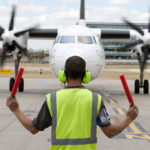In today’s coronavirus update, Bombardier closes its plants, Airbus waits for a government green light to start producing ventilators and IATA warns that a huge injection of liquidity is required to keep the airline industry alive.
Airbus awaits government call to start ventilator production
Airbus is awaiting a government call to start producing medical ventilators in the fight against COVID-19.
The manufacturer, which has factories in Broughton in North Wales and Filton in Bristol, is planning to scale up production of existing ventilator models as part of a consortium of industry manufacturers called Ventilator Challenge UK.
Companies within the aerospace and automotive sector including Meggitt, GKN Aerospace, Nissan and McClaren, answered a call from the government to quickly mass produce vital medical devices.
The government wants to increase the number of NHS ventilators from 8,175 to 30,000 but is still considering whether to choose vacuum cleaner manufacturer Dyson’s option of a newly designed ventilator, mass production of existing models, or to put into production both of the schemes.
Consortium includes Meggitt and GKN
Ventilator Challenge UK is putting together the plan which is thought to have made the most progress, working on designs by Smiths Medical, from Luton, and Oxfordshire-based Penlon. The two firms producing the initial design are unable to produce the number of ventilators required on their own, so will be drawing on the facilities of other consortium members which include engineers GKN, Meggitt and automotive company McLaren.
Both ventilator schemes are waiting on a government announcement deciding which or both to take forward – it is believed the announcement may be made from today.
IATA estimates passenger revenues will fall by $252bn
International Air Transport Association (IATA) has issued an update its analysis of the revenue impact of the Covid-19 pandemic on the global air transport industry.
IATA now estimates that industry passenger revenues could plummet by $252 billion as a result of the severity of travel restrictions and the expected global recession. The figure is 44 per cent below last year’s revenue. The estimate is based on a scenario in which severe travel restrictions last for up to three months, which are followed by a gradual economic recovery later this year.
IATA’s previous analysis of up to a $113 billion revenue loss was made on March 5, before countries around the world introduced sweeping travel restrictions which have largely eliminated the international air travel market.
“Airline industry faces its gravest crisis”
Director general, Alexandre de Juniac warned that immediate state aid was needed in order to save the sector: “The airline industry faces its gravest crisis. Within a matter of a few weeks, our previous worst-case scenario is looking better than our latest estimates.”
He added: “But without immediate government relief measures, there will not be an industry left standing. Airlines need $200 billion in liquidity support simply to make it through. Some governments have already stepped forward, but many more need to follow suit.”
The latest analysis envisions that under this scenario, severe restrictions on travel are lifted after three months. However, the recovery in travel demand later this year is weakened by the impact of global recession on jobs and confidence.
Full year passenger demand facing 38 per cent decline
IATA said full year passenger demand (revenue passenger kilometres) was set to decline by 38 per cent compared to 2019.
Industry capacity (available seat kilometre) in domestic and international markets declined 65 per cent during the second quarter ended June 30 compared to a year-ago period, but in this scenario recovers to a ten per cent decline in the fourth quarter.
Bombardier halts production for a month
Bombardier has closed its Belfast and Canadian sites for at least a month because of the coronavirus pandemic.
The decision at the Belfast facility came one day after staff expressed concern about social distancing at work.
The manufacturer will also halt its aircraft and train assembly lines in Canada after Quebec and Ontario ordered all non-essential businesses shut to stem the coronavirus pandemic. The measure takes effect from today until April 26.
More than 12,000 employees, or 70 per cent of Bombardier’s Canadian workforce have been temporarily laid off during the shutdown. In recent months Bombardier has announced deals to sell its trains and commercial aircraft divisions, using the proceeds to pay down its debts. The company will concentrate on its business jet division.
Lufthansa to park 700 aircraft
Europe’s largest airline Deutsche Lufthansa AG has announced it will idle 700 aircraft and 95 per cent of seats.
The move, by Chief Executive Officer Carsten Spohr, will reduce the flight schedule to a point last seen in 1955. Lufthansa will run a relief flight schedule in conjunction with governments until April 19, which will account for just five per cent of its scheduled programme. More than 20,000 passengers will fly to their home countries on special services from Lufthansa, Eurowings, Swiss, Austrian Airlines, Brussels Airlines and Edelweiss.
Spohr said: “We reduced our flight programmes more seriously and quicker than our rivals.” He said the announcement was first greeted by laughter from the group’s rivals, adding, “I can assure you that no one in our industry is laughing anymore.”
AAR Corporation calls for extension of US government aid to MRO sector
MRO and aviation parts company AAR Corporation is urging US Congress to include companies like his in the multi-billion dollar aid package to help the beleaguered airline industry.
AAR president and CEO, John Holmes, said he has talked with government officials in recent days about how grants or loans would help companies like AAR which have been hit by the rapid decline of air travel due to the COVID-19 pandemic.
Holmes told analysts: “A bailout or aid package needs to address more than just the airlines.”

